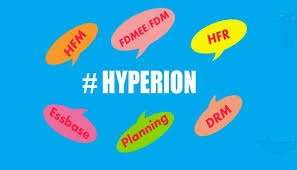Hyperion Training in Chennai
Learn Hyperion Training In Chennai At GREENS TECHNOLOGY – No 1 Hyperion Training Institute In Chennai. Call @ 9080125737 For More Details. Register today for learning basic Hyperion Training to go for advanced Hyperion Training in Chennai.

Hyperion is a Business Intelligence (BI) and Business Performance Management (BPM ) Tool. Its the market leader in Financial, Operational and Strategic Planning. It has applications for Planning, consolidation, scorecarding, reporting, dashboards, Analysis, Workspace, Master Data Management and Foundation. There is a sufficient demand in the industry for essbase consultants. Hyperion Training in Chennai is equipped with well trained human resources, Real-time Corporate Trainers, modern infrastructure - hardware and software resources.
Get Trained at GREENS TECHNOLOGY and become a Hyperion Guru!
Hyperion TRAINING COURSE CONTENT
ABOUT INSTRUCTOR
I work as a Senior Oracle Consultant for a Leading MNC in Chennai with 10+ years experience in both software development and training. Flexible Timings / Weekend classes Available.
About Jaspersoft Trainer
As a Trainer, Mr.Dinesh work as a BI Consultant for a Leading MNC in Chennai with 12+ years experience in both software development and training and very keen in delivering the BEST Jaspersoft Business Intelligence Trainings. The trainee can simply depend on Dinesh for his excellent Real Time examples on every part of the concept paired with in-depth discussions and Datawarehouse recommendations. All sessions are completely practical and very much interactive.
Hyperion Modules:
- · Hyperion Financial Manangement (HFM)
- . Hyperion Financial Reporting (HFR)
- · Hyperion Interactive Reporting (Brio)
- · Hyperion Essbase
- · Hyperion Web Analysis
- · Hyperion Planning
- · Hyperion Spread Sheet Services
- · Hyperion Master Data Management (MDM)
- · Hyperion Financial Data Quality Management (FDQM)
Hyperion Certification Training:
- · (1Z0-264) Hyperion Essbase 9.3 Developer
- · (1Z0-265) Hyperion System 9 BI+ 9.3 Administrator
- · (1Z0-271) Hyperion Financial Management 9.3 Administrator I & II
- · (1Z0-272) Hyperion Planning 9.3 Administrator I & II
- · (1Z0-531) Oracle Essbase 11 Certified Implementation Specialist
- · (1Z0-533) Oracle Hyperion Planning 11 Essentials Exam
- · (1Z0-532) Oracle Hyperion Financial Management 11 Certified Implementation Specialist
My training benefits
- My batch sizes are generally very small size 5-7 members OR 1 to 1 also, so students receive direct, hands-on training from us.
- 100% practical training only. It is not a slide show training program / theory class program. At the end of this class, definitely you will refer your colleagues / friends / relatives for my training.
- Conducting regularly online- training for US peoples in all time zones (PST,CST,EST,HST,MST)
- Installation of Softwares in your desktop / laptop will be done.
- Will be provided self evaluation testing software, exam simulator, dumps & books with this training.
- Continuous support is provided for any of your on-site problems. assistance will be provided and you will be recommended to some of IT development firms.
For Hyperion Corporate Training
- I will be more comfortable, if you could restrict the group not to exceed 20 persons.
- Training hours will be 40 Hrs/paper in view of 20 participants.
- Hardware for the required training should be provided by you, like Hall, Projector, and Furniture.
- I will be bringing my laptop for training purpose, which should be allowed in to your premises.
We offer job assistance (subject to project availability and partner requirements) for positions in India, Singapore, USA and the UK.
Talk to the Trainer @ +91-9080125737
Hyperion Course Content
Oracle Hyperion Planning 11 training in ChennaiOverview of Hyperion Planning
- · Describe the main features of Hyperion Planning
- · Describe the product architecture of Hyperion Planning
- · Access Planning through Workspace
Creating a Planning Application
- · Set up data source
- · Describe and use the Calendar
- · Described and use Plan Types
Modeling in Planning
- · Describe dimensions
- · Describe members and member properties
- · Create scenario dimensions
- · Create version dimensions
- · Set up entity dimensions
- · Set up account dimensions
- · Describe dense and sparse dimensions
- · Set up currencies and exchange rates
- · Set up user defined dimensions and attribute dimensions.
- · Data Loading
- · Describe different dimension build alternatives
- · Describe different data load alternatives
- · Share Planning data within an application and outside an application
EPMA
- · Describe EPM Architect
- · Create dimension members in EPMA
Forms Designer
- · Create and edit data forms and folders
- · Manage user variables
- · Create Custom Menus
- · Create Smart Lists
Planning End User Functions
- · Perform Planning End User features over the web
- · Use End User features in Smart View
- · Use work flow process management to copy data between application versions
Calculations, Business Rules, & Calculation Manager
- · Describe Business Rules and capabilities
- · Create and manage business rules
- · Describe and use member formulas and calc scripts
- · Use Calculation Manager
Planning Security and Administration
- · Describe security in Planning
- · Describe user provisioning in Shared Services
- · Provision users and groups for Planning
- · Generate provisioning reports
- · Assign access rights in Dimension Editor
- · Import access rights
- · Create security filters
- · Perform general application administration tasks
Other
- · Describe financial reporting basics
- · Described and use Workforce Planning
- · Describe and use Capital Expense Planning
Oracle Hyperion Essbase training in Chennai
Overview of Oracle Essbase
- · Describe multidimensional analysis
- · Describe Oracle Essbase
Smart View
- · Describe Smart View
- · Retrieve Data using Smart View
Essbase Application Creation Fundamentals
- · Perform manual outline creation
- · Build dimensions from sources
- · Perform initial data loads
- · Use calculations and aggregations
- · Assign security
Aggregate Storage Databases
- · Describe when to deploy aggregate storage, block storage, or a combined solution
- · Convert block storage to aggregate storage
- · Create, load, and pre-aggregate aggregate storage databases
- · Employ database partitioning in combined block/aggregate storage solutions
- · Write member formulas using MDX
- · Perform management tasks for aggregate storage databases
- · Partition block and aggregate storage databases
- · Describe and implement aggregate storage design best practices
- · Describe multiple hierarchies and the use of Shared Members
Block Storage Databases
- · Describe block storage calculations
- · Describe the default database calculation order
- · Describe data blocks
- · Interpret database statistics
- · Describe when data blocks are created
- · Describe the block storage database calculation process
- · Tune and optimaize block storage databases
- · Describe and implement block storage design best practices
- · Describe BSO load techniques
Working with Caluculation Scripts
- · Identify correct and incorrect calculation script syntax
- · Describe calculation script behavior for various BSO data structures
- · Design calculation scripts to meet specified requirements
Essbase Administration
- · Describe the file Essbase.cfg and its settings.
- · Describe the file Essbase.sec and its settings.
- · Identify and interpret Essbase log files
- · Manage Essbase security via Administration Services
- · Manage Essbase security via Shared Services
- · Back up and recover Block Storage Databases
- · Automate database processes with MaxL
- · Describe and use substitution variables and location aliases
Essbase Studio
- · Describe functionality of Essbase studio
- · Add and delete joins between tables
- · Create drill through reports
Oracle Hyperion Financial Management training in Chennai
Overview of Hyperion Financial Management
- · Explain financial reporting concepts
- · Describe HFM structure and design concepts a high level
Creating Applications -- Profile and Metadata -- Classic
- · Create an application profile and application
- · Create the application profile
- · Manage, Load and Extract metadata
- · Build a Chart of Accounts
- · Describe and specify values for commonly used properties
- · Describe and specify values for commonly used application settings
- · Describe and implement dimensionality
EPM Architect
- · Explain advantages and disadvantages of using EPMA versus "classic" HFM
- · Describe EPMA components
- · Define and maintain dimensions using EPMA
- · Create and maintain application using EPMA
- · Deploy applications
- · Use data synchronization to move data between EPMA-based applications Data Loading and Analysis
- · Load data into an application with native format files
- · Load data into an application using alterna tive approaches
- · Copy and clear data from HFM application
HFM Rules & Calculation Manager
- · Create and maintain calculations in HFM
- · Define and invoke subroutines
- · Define and use variables
- · Define and invoke functions
Creating and Building Lists
- · Create member lists.
- · Use member lists.
- · Load and Extract member lists.
Shared Services
- · Explain Security and Lifecycle Management
- · Describe security structure (i.e. users/groups, roles, and classes) in HFM
- · Provision users and groups
- · Create and assign classes
- · Manage users, groups and classes in a classic HFM application via extract/load
- · Use Lifecycle Management Services to move artifacts from one application to another
HFM Administration
- · Copy classic HFM applications
- · Perform application management tasks using the HFM Administration menu
- · Implement process control
- · Perform HFM tuning and optimization
Other
- · Use task lists
- · Use data grids
- · Use data entry forms
- · Use Journals.
HFM End User Advance Functions
- · Implement intercompany reporting in HFM
Financial Reporting Studio
- · Explain and use the basic features of Financial Reporting Studio
- · Explain and use relationship functions in report creation
- · Use end user report functionality and features
Supporting Tools of FM
- · Financial Data Quality Management
- · Other - Extended Analytics
Planning Overview
- · Describe the main features of Hyperion System 9 Planning
- · Describe the product architecture of Hyperion System 9 Planning
- · Describe the relationship between Hyperion System 9 Planning and Hyperion System 9 BI+ Analytic Services
Navigating Workspace
- · Describe the user interface components
- · Access Planning through Workspace
- · Navigate the Planning Web client
Creating Dimensions Overview
- · Identify required dimensions
- · Identify user-defined dimensions
- · Describe dense and sparse dimensions
- · Describe data block creation
- · Set up aggregation, data storage, and calculation options
Managing Dimensions with BPM Architect
- · Describe BPM Architect
- · Navigate BPM Architect
- · Manage Dimensions
- · Create Dimension Members
- · Edit Member Properties
- · [Data Types (Dates, Text)]
- · Create Property Associations
- · Add and modify currencies
Setting Up the Period, Scenario, and Version Dimensions
- · Describe Planning time periods
- · Customize time periods
- · Create scenarios
- · Create versions
Setting Up the Entity Dimension
- · Add entity members to the Entity dimension
- · Modify entity members in the Entity dimension
- · Delete entity members in the Entity dimension
Setting Up the Account Dimension
- · Describe account types and consolidation order
- · Create account hierarchies
Creating User-Defined Elements
- · Create Alias Tables
- · Create user-defined dimensions
- · Create attributes and assign attribute values
- · Describe member formulas
- · Add member formulas in Analytic Administration Services
- · Create Smart Lists
Loading Metadata from a File
- · Format metadata load files
- · Map dimensions and dimension properties
- · Create Profiles
- · Load and extract Metadata
Creating Application Views
- · Create Application Views
- · Add dimensions to Application Views
- · Configure application properties
- · Remove members
Deploying Applications
- · Validate application views
- · Compare application views
- · Deploy applications
- · Activate and register Planning using the Configuration Utility
- · Review Planning application in Analytic Administration Services (???)
- · Test Application Deployments
- · Redeploy Applications
Setting Up Exchange Rates
- · Create exchange rate tables
- · Enter exchange rate values
- · Generate currency conversion calculation scripts
Loading and Calculating Data Overview
- · Describe the requirements for data load files
- · Describe data load rules
- · Describe how data is calculated within dimensions
Loading Data
- · Load data using the staging area
- · Create load rules for data files for Analytic Services
- · Load data using Analytic Administration Services
- · Modify performance settings
Provisioning Users and Groups
- · Describe security in Planning
- · Describe user provisioning in Shared Services
- · Provision users and groups for Planning
- · Generate provisioning reports
Setting Up Access Rights to Planning Applications
- · Assign access rights in Dimension Editor
- · Import access rights
- · Create security filters
Creating Data Forms and Folders
- · Create data forms and folders
- · Print data form definition reports
- · Assign access rights to data forms
- · Associate Custom Menus to Data Forms
- · Export and import data forms
Customizing Data Forms
- · Create Custom Menus
- · Specify application default settings
- · Manage user variables
- · Set up user preferences
Entering Data
- · Enter and submit data in data forms
- · Adjust and annotate plan data
- · Calculate data in data forms
- · Enter data by using Smart Lists
- · Navigate data forms by using Custom Menus
Entering Data in Smart View
- · Describe Smart View
- · Enter, adjust, calculate, and analyze data with Smart View
- · Modify planning data offline
Creating Business Rules
- · Describe Business Rules and capabilities
- · Navigate Administration Console to design business rules
- · Create business rules
- · Launch business rules from Planning
- · Print business rules
Building Run-Time Prompts for Business Rules
- · Describe Runtime Prompts
- · Create Runtime Prompts
Adding Formulas to Business Rules
- · Identify the four formulas included with Business Rules
- · Build formulas for business rules
- · Manage Business Rules
Planning Process Management
- · Explain the planning process
- · Describe planning units
- · Manage the review cycle for planning units
- · Copy data between versions
- · Copy data
- · Delete textual information
Creating Task Lists
- · Define task list capabilities
- · Navigate task lists in Basic and Advanced modes
- · Create task lists
- · Assign Access to task lists
- · Validate task lists
Financial Reporting Overview
- · Describe Financial Reporting
- · Describe Data Sources
- · Navigate Financial Reporting Studio
- · Log on to Financial Reporting Studio
- · Identify portions of the Financial Reporting Studio workspace
- · Open, Preview, and print reports
- · Identify report components
- · Change the user POV
Navigating Reports in Workspace
- · Identify interface elements in Workspace
- · Set preferences
- · Set the user POV
- · Limit user POV user selections
- · Integrate reports into Microsoft Office applications
Financial Reporting Overview
- · Describe the components and general architecture of System 9
- · Describe Financial Reporting functionality and architecture
- · Identify data source dimensions and members
- · Start the Analytic Services server
Navigating Reports in Workspace
- · Identify interface elements in Workspace
- · Set preferences
- · Preview and print reports
- · Set the user Point of View (POV)
- · Limit the user POV member selections
- · Integrate reports into Microsoft Office applications
Navigating Reports in Financial Reporting Studio
- · Log on to Financial Reporting Studio
- · Identify portions of the Financial Reporting Studio workspace
- · Open, preview, and print reports
- · Identify report components
- · Change the user POV
Creating Basic Reports
- · Create reports and grids
- · Select members for rows and columns
- · Set the POV
- · Modify reports by adding rows and columns
- · Save reports
Applying Advanced Member Selections
- · Select members by using lists
- · Select members by using functions
- · Select multiple members by using expressions
- · Select members for the page axis
- · Set data query optimization options
Customizing Grids
- · Select multiple database connections in a grid
- · Attach documents to reports
- · Display Planning supporting detail
- · Create reports with expansions
- · Create reports with related content
Formatting Cells and Grids
- · Format cells within a grid
- · Format grids
- · Sort a range of rows or columns
- · Suppress data in a grid
- · Apply conditional formatting in a grid
- · Specify the page setup
Creating Report Objects
- · Create text boxes in a report
- · Add images to a re port
- · Save and link objects
- · Insert saved objects into a report
- · Add headers and footers to a report
- · Create row and column templates
Creating Charts
- · Create bar, line, pie, and combo charts
- · Format charts
Adding Text Functions
- · Describe the purpose of text functions
- · Add text functions to reports
- · Describe common text functions
Adding Auto Calculations and Mathematical Functions
- · Describe the purpose of auto calculations and mathematical functions
- · Add auto calculations to data rows and columns
- · Apply mathematical functions and properties to perform calculations
- · Describe common mathematical functions
Creating Books
- · Preview books in PDF and HTML modes
- · Change the book POV
- · Create books containing multiple reports
- · Set member selections for reports in a book
Creating Batches
- · Create and schedule batches to automatically generate reports
- · Schedule batch bursting options
- · Retrieve exported batch output from the Scheduler Server
Managing Items in the Repository
- · Create e-mail links
- · Create folders
- · Rename, move, and delete items in the repository
- · Import and export items
- · Manage database connections
- · Set permissions for repository items
You can contact us @ 9080125737 or fill in the enquiry form to get detailed information about Hyperion training in Chennai. Join Greens Technology for Best Hyperion training in Chennai.





